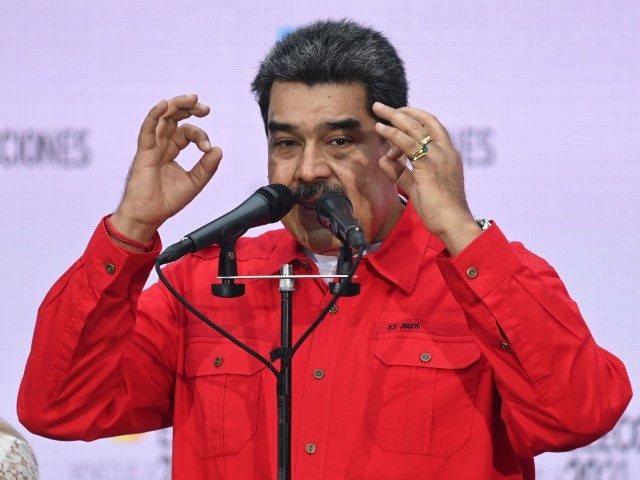Venezuelan socialist dictator Nicolás Maduro announced on national television this week that his regime would pressure citizens to receive a Chinese coronavirus vaccine booster shot every four months.
Maduro boldly declared Venezuela to be “the first country in the world that has decided scientifically to administer booster shots every four months after the second portion of the main vaccine,” according to state television network VTV. The dictator was speaking on a broadcast to observe the anniversary of the first quarantine measures he imposed on the country in response to the new disease, which began to spread in Wuhan, central China, in late 2019.
“We’re going to hit the booster campaign hard because,” he explained, “from now on, until further notice that they discover new medicines to cure coronavirus like just another cold – or that they produce a vaccine that offers total, long-term immunity – until that moment comes, we are going to have to get booster vaccines every four months, I say this responsibly.”
¡Ponte el refuerzo! Es el llamado que le hago a toda la población venezolana para seguir controlando la Covid-19 y garantizar la actividad social y económica del país. A las madres, padres, abuelos y abuelas les recuerdo que la vacunación debe ser cada cuatro meses. pic.twitter.com/dV4YIsPQKd
— Nicolás Maduro (@NicolasMaduro) March 16, 2022
Maduro appeared to imply that, should Venezuelans not adhere to the four-month vaccination schedule, he would lock down the country again.
“How pretty the streets of Venezuela look with people going about their daily, commercial, cultural, musical, labor, educational activities,” Maduro mused. “How pretty the schools look, the academies and universities full of adolescents.”
Maduro also claimed that the entire population of Venezuelan adults was fully vaccinated against Chinese coronavirus, and 60 percent of minors had received their immunizations – an astounding number given that, as recently as last summer, Venezuelan authorities were struggling to provide vaccines to individuals who scheduled themselves for appointments to receive them, resulting in vaccination centers turning people away after as long as 12 hours in line waiting for doses. A transparent tally of the number of people who have been vaccinated in the country, according to the Associated Press, remained “unclear” as of July.
“If we look at the promises with the Russian and Chinese vaccines, there’s a lot of emphasis on the agreements and the numbers, and then the delivery of those vaccines and who gets what in Venezuela becomes much more mysterious,” Jacqueline Mazza, senior adjunct professor of Latin American studies at Johns Hopkins University, told the AP at the time. “Simply put, the numbers just aren’t there. … It’s all shrouded in mystery, and clearly, the figures that are not giving us the true story.”
More recently, in November, the Maduro regime attempted to implement a mobile phone-based vaccine passport application known as the “Stoplight” app that would have, in theory, required patrons of restaurants, shops, and other businesses to show proof of vaccination before entering the location. The regime failed to impose the system as it could not handle the volume of demand from businesses forced to sign up for the phone application, and a combination of extreme poverty and electricity shortages made using the system impossible.
The Maduro regime has long faced international skepticism about its official coronavirus data. Human Rights Watch described the official coronavirus statistics from the Maduro regime as “absurd” in 2020. Since then, reports from the country have observed anecdotal evidence, such as elevated business at funeral homes and crematories, suggesting that the true death toll of the disease in the country is far higher than government estimates. The Wall Street Journal reported last year that some observers believe that as many as 20 times more people have died than what the Maduro regime has publicly documented.
At press time, Venezuela has reported a little over half a million coronavirus cases since the pandemic began there in 2020 and 5,663 deaths attributed to coronavirus infections. Regional data shows a striking difference: neighboring Colombia has documented 6 million coronavirus cases and nearly 140,000 deaths; Brazil, which shares its northern border with Venezuela, has documented 29.4 million cases and over 22,000 deaths.
In remarks this week, Maduro’s call for booster shots did not specify which vaccination product residents should receive booster shots of. Pharmaceutical institutes around the world have developed a dizzying array of products branded coronavirus vaccines that use different methods of promoting an immune response from the body, some of that has been shown to spur a greater reaction in the body than others. At press time, Venezuela has received vaccine donations of Sputnik V, the first vaccine product approved anywhere in the world, from Russia, and two products from China, the Sinovac and Sinopharm shots. Maduro has also imported doses of experimental vaccine products from Cuba that have not been in widespread international use. The science behind each product is different, likely affecting when, or even if, a patient should receive any booster doses.
Sinovac, Sinopharm, and the Gamaleya Institute, which manufactures the Sputnik line of vaccine products, claim that one booster shot makes their products more effective. Cuba’s Finlay Institute began experimenting with mass distribution of booster doses in January.
The World Health Organization (W.H.O.) has repeatedly warned against booster vaccination campaigns.
“Blanket booster programmes are likely to prolong the pandemic, rather than ending it, by diverting supply to countries that already have high levels of vaccination coverage,” W.H.O. Director-General Tedros Adhanom Ghebreyesus said in December, “giving the virus more opportunity to spread and mutate.”
“No country can boost its way out of the pandemic,” Tedros warned.
A W.H.O. “expert group” appeared to reverse course last week, stating it “strongly supports urgent and broad access” to boosters.

COMMENTS
Please let us know if you're having issues with commenting.